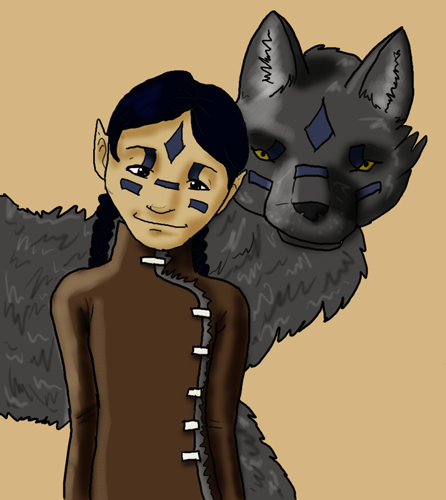





|
Wolfriders
Range: Wolfriders are native to Elcenia. They primarily live in wolfrider territory. Lifespan: 70 Elcenian years (51 Barashin years) Wolfriders are actually two symbiotically linked species, wolves and riders. The wolves are much larger than ordinary wolves (about 5'6" tall at the shoulder when fully grown) but otherwise look the same as their nonsapient counterparts. Riders resemble compact half-elves, universally with light skin, epicanthal folds, and black hair. Both wolves and riders can survive on a carnivorous diet, although they benefit from some addition of plant life, especially riders. Riders produce lights, sorcerers, and mage potential at the normal rate; wolves never demonstrate magery, sorcery or lightcraft. Both species are mildly telepathic: they can communicate on an (audition-like in range and privacy) channel of mentally added meaning and linkages between things. This telepathy constitutes the bulk of their language, which has only a few hundred words and relies on telepathic "backchannel" to add color and replace grammar; over longer distances they rely on a simple howling code that wolves use. In addition to backchannel, which allows any wolves and riders to communicate with any others, each wolf and each rider has a same-sex "bondmate" of the other species. Bondmates have absolute telepathic access to each other over any range; they literally cannot hide thoughts from each other. Riders usually speak for the pair, but they are equal partners. Bonds are formed when infants are three days old, and cause the formation of matching facial marks on both. A wolfrider whose bond dies will die within several days, but preceding this natural expiration with suicide is typical. Bonds marry in pairs, and with few exceptions, a wolf and her rider will conceive at the same time and produce simultaneous offspring of the same gender. (Twins occasionally happen for one but not the other, and sometimes one member of a pair miscarries while the other does not, and occasionally the wolf and the rider babies will be of different sexes which prevents successful bonding; babies can be bonded to the children of a couple other than their parents' bondmates, but these exceptions to the rule are very rare, and coincidences occurring close enough together to allow this rarity are almost unheard of.) Wolfriders spend their childhoods (birth to age eleven or twelve) with their parents, but after that, when the wolf grows strong enough to carry his or her rider, they join packs, which are more mobile than families. Packs are bands of ten to twenty-five pairs, all the same gender, and wolfriders remain in them until they marry (with rare exceptions). The oldest pair in a pack generally leads it. In packs, newer members learn from older members about the "crafts" of the people: bonecarving, leatherworking, singing/storytelling, hunting, firebuilding, and dance. Wolfriders are granted monosyllabic names when they are born, which always end with vowel sounds ("a" or "i" for girls, "o" or "u" for boys). They keep these names until bonded, at which time they add their bond's monosyllable to the end of their name (e.g. a wolf named Ni and a rider named Na who were bonded would become, respectively, Nina and Nani). After this occurs, no one except one's bond is entitled to refer to one by one's one-syllable name; doing so is a grave insult. A third syllable, corresponding to one's pack, is added when one joins a pack (e.g. if Nina and Nani joined the Ri pack, they would become Ninari and Naniri). A fourth and final syllable is added upon marriage (e.g. if Ninari and Naniri married a pair called Koluro and Lukoro, they would all become Ninariko, Nanirilu, Koluroni, and Lukorona). Wolfriders do not have detectable ethnic variations. (Wolves come in assorted shades of black, white, and gray, but this involves many genes and there aren't geographical regularities about it.) The following characters are wolfriders:
|


